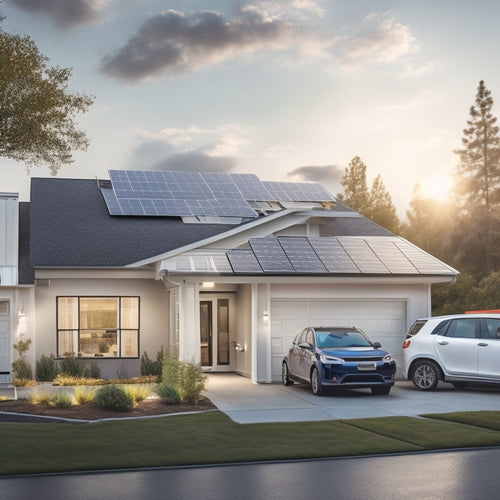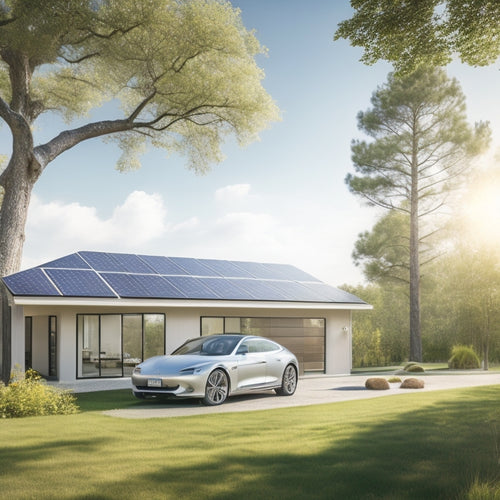
Best Solar Solutions for Your Home
Share
When investing in solar energy for your home, you'll want to examine top solar panel brands like Tesla, Panasonic, and SunPower, which offer high-efficiency features and extensive warranties. You'll also need to evaluate the total system costs, ranging from $15,000 to $30,000 or more, and investigate financing options like home equity loans and solar-specific loans. Additionally, choosing the right solar inverter and battery, and maximizing solar efficiency through ideal panel orientation and energy-efficient appliances, can greatly reduce your carbon footprint and energy costs. Now, take a closer look at each of these components to tailor a solar solution that fits your needs.
Key Takeaways
- Research top solar panel brands like Tesla, Panasonic, and SunPower for high-efficiency features and extensive warranties.
- Consider financing options like home equity loans and solar-specific loans, and claim tax incentives like the Solar Investment Tax Credit.
- Choose the right solar inverter type (string or microinverter) based on energy needs, budget, and system design for optimal energy production.
- Select a suitable solar battery type (Lead-Acid, Lithium-Ion, or Sodium-Ion) that aligns with energy needs, and ensure proper installation and maintenance.
- Optimize solar efficiency at home by assessing energy consumption habits, scheduling high-energy appliance use during peak sunlight hours, and upgrading to energy-efficient appliances.
Top Solar Panel Brands Compared
Your search for the best solar panel brand begins with understanding the top players in the market.
You'll find that top-tier brands like Tesla, Panasonic, and SunPower offer high-efficiency solar panels with advanced features such as bifacial cells and half-cut cells. These solar panel features enable higher energy yields and improved durability.
When evaluating solar brands, you should also consider their warranties. Reputable brands provide extensive warranties that cover both product and performance. For instance, Tesla offers a 25-year warranty on its solar panels, while Panasonic provides a 25-year warranty on its HIT-240 model.
Solar brand warranties can give you peace of mind, as they guarantee a certain level of performance and protect your investment.
Other key players in the market include LG, Trina, and Hanwha Q CELLS. Each brand has its strengths and weaknesses, so it's important to research and compare their products to find the best fit for your needs.
Solar Energy System Costs Explained
Now that you've narrowed down your options for the best solar panel brand, it's time to evaluate the costs associated with installing a solar energy system. The total cost of a solar energy system includes the equipment, installation, and additional expenses like permits and inspections.
On average, the total cost ranges from $15,000 to $30,000 or more, depending on the system size and quality.
Fortunately, there are financing options available to help make solar energy more accessible. You can consider financing through a home equity loan, personal loan, or solar-specific loan.
Additionally, you may be eligible for tax incentives, such as the Solar Investment Tax Credit (ITC), which allows you to claim a credit of 26% of the total system cost. These incentives can greatly reduce the upfront cost of installing a solar energy system.
Be sure to research and investigate the financing options and tax incentives available in your area to maximize your savings.
Best Solar Inverter Options Available
Selecting the right solar inverter is an essential step in ensuring your solar energy system operates efficiently and effectively.
You'll need to decide between a string inverter and a microinverter, each with its own advantages and benefits.
String inverters are the most common type, offering several advantages. They're generally more cost-effective and easier to install, with a single inverter handling multiple panels.
However, if one panel is shaded or malfunctioning, it can impact the entire system's performance.
Microinverters, on the other hand, are installed under each panel, providing more individualized control.
Their benefits include increased energy production, even when some panels are shaded or malfunctioning. They also offer real-time monitoring and troubleshooting capabilities, making it easier to identify and address issues.
While microinverters are more expensive upfront, they can provide a higher return on investment in the long run.
Consider your energy needs, budget, and system design when choosing between these two options.
Choosing the Right Solar Battery
Choosing the Right Solar Battery
Several key factors come into play when choosing the right solar battery for your home, as it's an essential component in guaranteeing a seamless and efficient energy storage experience.
You'll want to take into account the type of battery that best suits your needs, as well as installation tips to guarantee a hassle-free setup.
When it comes to battery types, you have three main options:
-
Lead-Acid Batteries: Cost-effective and widely available, but heavier and less efficient than other options.
-
Lithium-Ion Batteries: More expensive, but offer higher energy density, longer lifespan, and faster charging times.
-
Sodium-Ion Batteries: A newer, emerging technology that promises a more sustainable and cost-effective alternative to lithium-ion.
When installing your solar battery, keep in mind these important tips: guarantee proper ventilation to prevent overheating, follow the manufacturer's installation instructions, and take into account consulting a professional if you're not experienced with electrical work.
Maximizing Solar Efficiency at Home
You've selected the right solar battery for your home, but how do you ascertain you're getting the most out of your solar energy system? Maximizing solar efficiency at home requires attention to detail and a few simple adjustments.
First, verify your solar panels are installed at the best orientation to capture the most sunlight throughout the day. A south-facing orientation is usually ideal, but this may vary depending on your location and roof layout.
Next, assess your energy consumption habits to identify areas for improvement. Identify patterns of high energy usage and adjust your habits accordingly.
For example, running appliances like dishwashers and washing machines during the day when the sun is shining can reduce your reliance on the grid.
Additionally, consider upgrading to energy-efficient appliances to minimize your overall energy consumption.
Frequently Asked Questions
Can I Install Solar Panels on a Metal or Clay Tile Roof?
As you're considering solar power, you're likely wondering if your metal or clay tile roof is compatible; coincidentally, both options are viable, with metal roofs offering a more straightforward installation process and clay tile roofs requiring specialized mounting systems.
How Often Should I Clean My Solar Panels for Optimal Performance?
You should clean your solar panels every 6-12 months to guarantee peak performance, using gentle cleaning techniques and avoiding harsh chemicals, as part of regular solar panel maintenance to maximize energy output.
Are Solar Panels Durable Enough to Withstand Extreme Weather?
You're wondering if solar panels can withstand extreme weather. Rest assured, they're built to last, with a typical solar panel lifespan of 25-30 years, and designed to resist extreme weather conditions, including hail, high winds, and heavy snow loads.
Can I Sell Excess Energy Generated Back to the Grid?
You'll be interested to know that the US has over 1 million net metering customers! With net metering benefits, you can sell excess energy generated back to the grid, offsetting your utility bills and even earning credits when you produce more than you consume.
Do Solar Panels Void My Roof's Warranty or Insurance?
When you install solar panels, you're likely wondering if it'll void your roof's warranty or insurance. Fortunately, most manufacturers won't nullify your warranty, but you should review roof warranty considerations before solar panel installation to guarantee you're covered.
Related Posts
-

What Electric Vehicle Owners Need for Home Energy
As an electric vehicle owner, you need to optimize your home energy system to guarantee efficient, sustainable, and c...
-

Why Invest in Solar Car Battery Chargers Online?
By investing in a solar car battery charger online, you're not only reducing your reliance on fossil fuels but also o...
-

3 Best State and Local Solar Incentives USA
You can greatly reduce your energy dependence and save thousands of dollars by taking advantage of the top state and ...


